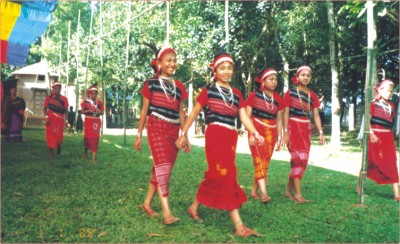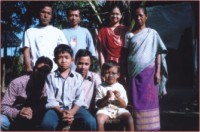| Feature
'They mean a lot to us now'
A memorable trip to Modhupur

We set out on the highway at Mirzapur for Modhupur in the morning of October 28. It was the first day of the blockade program enforced by AL-led 14-party alliance. Nothing was symmetrical that morning, except our wish and desire to make way through the life-disrupting political program to another life where nature and humans still co-exist in total harmony.
Though our team was originally planned to consist of eight members, actually four of us were able to begin our journey for Sholakori, where Mandi, a community of Garo people live in Peergacha in Modhupur under Tangail district. The team included Suman, Munni, Alamgir and me. Others could not turn up due to the unexpected political developments.
A family of Garo people in Sholakori had actually invited us to attend Wangala, annual harvest festival of Mandi people to be held on October 29. It was a cordial invitation and we could not say no. Hence we embarked on the journey defying the endearing appeal of our parents for not going out of our homes in the prevailing political turmoil. Facing several street blockades we made the journey through burning tires and violent demonstrators in various modes of transports like three-wheeler-van, tempo, rickshaw and sometimes on foot. The supposed two-hour journey ended in the evening after seven-hour of our hectic effort to reach the destination.
As soon as we reached the place, we forgot all sufferings we had undergone on our way to the destination. The sun was setting in the western horizon and we had the glimpse of a half-moon in the sky over the forest of Modhupur. The bright moon stayed with us until 10:00 in the night offering us the fascinating opportunity to walk on the winding roads through the forest and to listen to the ancient faith and myth of the poverty-stricken people of the Garo community. The flickering light of the oil lamp whispered the tale of forest life in the profound silence of the place amidst darkness all around.
The next morning was mesmerizing as we found Munni, one of our teammates, going around with the Mandi girls of her age in Nokmandi, a traditional dress worn by the Garo people, celebrating Wangala . The dress totally changed her looks and her mood. We enjoyed the daylong Wangala along with our host Teeres Nokrek and Porimola Mree. The host couple humbled us with their hospitality.
 |
| The writer in the middle of front row |
Wangala
The word gradually changed from the root word Wanna, ancient name of annual harvest festival of Mandi people, after Christian missionaries started to appear in the area. Wanna, a religious rite and ritual of Mandi people, is the harvest festival through which Garo people make their offerings to different deities including Bagba, Shushmi, Goera, and Tatara.
According to their religious belief Mishi Shaljong, the supreme God, along with his daughter, son and other deities visit them after the harvest and the ancient people start a fresh year through thanksgiving.
We came to know that the traditional language of Mandi people called Achikni is found now in written form. The Mandi community has to use English alphabets to write down or spell their own language. Traditional music and dances including Grik A, Azia, Ray Ray, Serejing and Jolana are getting extinct because of severe financial crisis.
Fortunately we also observed a marriage ceremony at Chunia in Modhupur. Tuly Rema (19), Jek, the bride who resides at Chunia, and Sandweep Mree (20), Angshi, the bridegroom, a resident of neighboring village Joynagacha, knew each other for last three years. At the very first meeting both grew a Singriga, fondness, for each other that very soon developed into Sinnan, love-affair. The ceremony was totally different in taste and flavor.
Local families also arranged several family programs of their traditional songs in honor of us. Sitting on the courtyard of their thatched house we heard the songs at night under a sparkly-lit sky.
Teeres Nokrek and Porimola Mree including their centenarian mother did not let us return home on October 30. Finally, they accompanied us until we got on a three-wheeler-van for home and to our astonishment Porimola Mree and her seven-year-old son Swadhin started to run alongside the van crying. As the curious van-puller asked about the relationship between us and the Mandi people, we only replied "They mean a lot to us now."
Emran Hossain is JU Correspondent of
The Daily Star
Copyright
(R) thedailystar.net 2006
|
